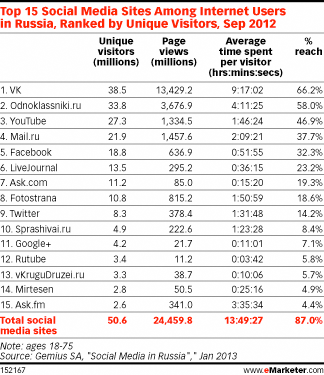 On first glance, it might seem possible to sum up the global social network landscape in a single word: Facebook. With almost 1.1 billion users expected by the end of 2013, Facebook has become the top social network in nearly every country in the world except China and Russia. However, it is far from the only social network internet users worldwide access. Even with a clear leader, the global landscape is too complex to be summed up with a single site, according to a new eMarketer report, “The Global Social Network Landscape: A Country-by-Country Guide to Social Network Usage.”
On first glance, it might seem possible to sum up the global social network landscape in a single word: Facebook. With almost 1.1 billion users expected by the end of 2013, Facebook has become the top social network in nearly every country in the world except China and Russia. However, it is far from the only social network internet users worldwide access. Even with a clear leader, the global landscape is too complex to be summed up with a single site, according to a new eMarketer report, “The Global Social Network Landscape: A Country-by-Country Guide to Social Network Usage.”
What follows is a sample of key social networking trends in various countries.

It is almost impossible to have a discussion about the social network landscape in Asia-Pacific without including mobile messaging applications. Mobile messaging applications originally began as text and audio messaging services but many have started adding social networking features like group chat, video chat, file-sharing, photo feeds (similar to Instagram) and friending capabilities, to name a few.

China has one of the largest and most unusual social media landscapes in the world. Because China’s government blocked Facebook and Twitter, regional social networks have filled the void. Qzone is the most popular social network, but microblogs (known as weibo) have seen the largest growth in recent years. In fact, the China Internet Network Information Center (CNNIC) found in June 2012 that microblog use exceeded traditional social network use: 50.9% of internet users had a microblog account, vs. 46.6% belonging to a social network.

Mobile messaging applications are also gaining popularity and could begin to threaten the dominance of weibo. Currently, WeChat is the most popular mobile messaging application in China, surging in popularity since its relatively recent launch in 2011.

orkut was once the most popular social network in Brazil, but Facebook has since taken the top spot. A study from F/Nazca Saatchi & Saatchi found the percentage of internet users accessing orkut fell from 78% in April 2011 to 57% in April 2012. Experian Marketing Services (formerly Serasa Experian Hitwise) placed the site third in April 2013. eMarketer estimates Facebook user growth will reach 48.5% in Brazil this year.

Russia is one of the only countries where Facebook doesn’t dominate the social market. Instead, homegrown social networks remain popular. VK (formerly VKontakte) is the most widespread, with more than twice as many users as Facebook, according to a September 2012 study from Gemius SA. The site bears many similarities to Facebook—with one notable exception: VK allows users to stream a vast array of entertainment media within the site. Odnoklassniki.ru, which focuses on connecting classmates, is also a popular social network in the country that surpasses Facebook.

Still, Facebook has seen major growth in Russia. eMarketer estimates the social network saw user numbers rise by 62.8% in 2012 and expects a 57.8% increase this year, with double-digit growth continuing through 2017.
Facebook is the dominant social network in Germany. Still, internet users in the country turn to Facebook less than any other nation in the EU-5. eMarketer estimates 38.0% of internet users will use the social site in 2013.
Regional social networks remain popular in Germany. Depending on the source, XING, StayFriends and wer-kennt-wen.de rank among the top five social networks, frequently topping sites like Twitter and Google+. VZ-Netzwerke used to be one of the most popular social networks in the country but has since lost many of its users—no longer placing in the top 10 in many rankings.
As in much of the Middle East, Facebook is the top social network in the United Arab Emirates (UAE). According to GlobalWebIndex, 78% of internet users in the UAE accessed the site in Q1 2013. In addition, Facebook users grew nearly 10.4% between Q2 2012 and Q1 2013. Google+ and Twitter round off the top three social networks in the country.
The UAE’s population is more likely to be online than in any other country in the Middle East: 71% of the nation’s residents were online in December 2012, according to Ipsos MediaCT. As a result, a significant portion of the population is using social media; the Dubai School of Government found 40.6% of people in the UAE were accessing Facebook in June 2012. Only Israel ranked higher.
For more information CLICK HERE.




